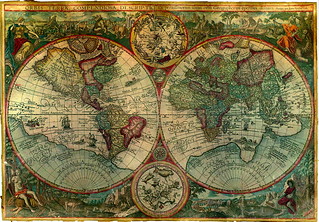The Absurdity of the Present: Stealing Vaccine Research
Last week the breaking news in international political/media drama was the Russians hacking vaccine research in Europe and America, and on Tuesday the DOJ charged two Chinese hackers for hacking what Politico called “hundreds of millions of dollars worth of intellectual property and trade secrets” about vaccines for a deadly virus that is currently ravaging humanity.
Right now the world is working on a lot of vaccines, as well as treatments, for and research about the virus. We’re not just trying to end it, we’re trying to pull the virus, and ourselves, out of the fog of war that we’re in right now. Some of that research is ending up as trade secrets and intellectual property, the modern legal equivalent of what was once the secrecy of alchemists.
Russia and China are not rich countries the way the US is, though they are spending their blood and treasure on medical research and treatment just like the rest of us. Journalists and experts, particularly in cybersecurity, have blasted their efforts at hacking European and North American corporations as a kind of greed and cheating when it comes to the vaccines research process.
This all makes sense, from the perspective of the absurdity of the present moment. As Misha Glenny, a cybersecurity reporter who went on the BBC’s Newscast to blast the Russian effort to get medical research data said, “They’re just trying to get a vaccine on the cheap as far as I can see.”
Of course they are. It’s a fucking vaccine for a disease that’s causing a global pandemic.
Before we talk about how important it is to motivate biotech firm Moderna to work on a medicine that could save millions and put the planet to rights again (at least in this one way), let’s talk about where we are right now.
As of this writing, there have been 15 million confirmed cases of Covid-19 and 600,000 deaths. It’s clear there will be millions of deaths before the pandemic is over and millions more maimed from the inside by the disease. There is also the suffering of families and communities as folks bury some of their loved ones and support loved ones who will suffer with the long term effects of Covid-19 for years or decades. There is no global public health infrastructure or even much in the way of public health standards around the world.
Most people can’t get good quality care at the best of times, even though we have the ability as a species to provide it several times over. It’s normally bad and it’s all much worse right now. Pediatric vaccination rates has fallen through the floor the world over, and it could be that millions more children die of preventable diseases than adults of Covid-19, just because Covid-19 has wrecked public health infrastructure so badly. And with economic downturns around the world, there’s no money to pay for routine care which could cost more lives than the disease itself, again.
But there’s reasons things are shut down. The thing about a respiratory virus like SARS-CoV-2 is that it’s so aggressively transmissible that no one is safe until everyone is safe. Despite how much we all hate each other, if Russian and Chinese people can’t vaccinate against both Covid-19 and Measles, we will all pay, in blood, and treasure, and the kind of grief that takes generations to mend.
Will those generations care about Moderna, GlaxoSmithKline, or Sanofi’s Q4 2020?
No, they will not care. They will be as mystified by what we’re doing now, by what we’re valuing now, as we are by the people in history who drank mercury trying to live forever, or attached leeches to George Washington until he died of blood loss, or any of the other stupid things we did that killed people or actively spread disease over the millennia.
We still live with the biological and cultural trauma of the Black Death, and our whole world order was configured by Smallpox. But still, we are ghouls and deatheaters, asking about intellectual property rights when someone is using hacking to try to save lives, for once.
Why is any of this, any of this at all, still a secret? Why isn’t all the data and research being published and collated and poured through by the scientific community the moment the data is collected? Why are we still such ghouls when it comes to public health?
Why do children still die of Measles? Why do 10 million people fall ill with TB every year? Why, in fucking 2020, do people die of fucking Consumption?
We could stop all of this.
But we think health should be a profitable business, like it’s making fancy handbags or golf clubs or something.
We don’t think voting is something you should pay for, or that only the well enough off should be governed. We don’t think streets should turn a profit, or that you should pay a monthly fee to maintain your human rights. We don’t even think you should pay firefighters to save your house, especially since it’s going to set the rest of your city on fire. But we think Chinese people or Russians or you should pay for a vaccine, even though if you can’t, it’s going to set the rest of your city and then the world on fire.
It’s evil, it’s madness, and the fact that it’s just the way things are doesn’t make it even the tiniest bit less absurd. And my colleagues in the media would do well to point that out, and not just leave it to comment sections below their articles and Trevor Noah.
My work for Emptywheel is supported by my wonderful patrons on Patreon. You can find out more, and support my work, at Patreon. Thanks to Ryan Singel.




 I’ve been reading We Have Never Been Modern, a 1991 book by the French thinker Bruno Latour, pictured above. It doesn’t lend itself to my usual treatment, reading and commenting on a chapter or two. Instead, I’m going to try to lay out some of the aspects that seem important enough to merit discussion.
I’ve been reading We Have Never Been Modern, a 1991 book by the French thinker Bruno Latour, pictured above. It doesn’t lend itself to my usual treatment, reading and commenting on a chapter or two. Instead, I’m going to try to lay out some of the aspects that seem important enough to merit discussion. 
![[Photo by Piron Guillaume via Unsplash]](https://www.emptywheel.net/wp-content/uploads/2017/07/Healthcare_PironGuillaume-Unsplash_v1.jpg)



![[Photo: Annie Spratt via Unsplash]](https://www.emptywheel.net/wp-content/uploads/2017/08/Books_AnnieSpratt-Unsplash_mod1.jpg)